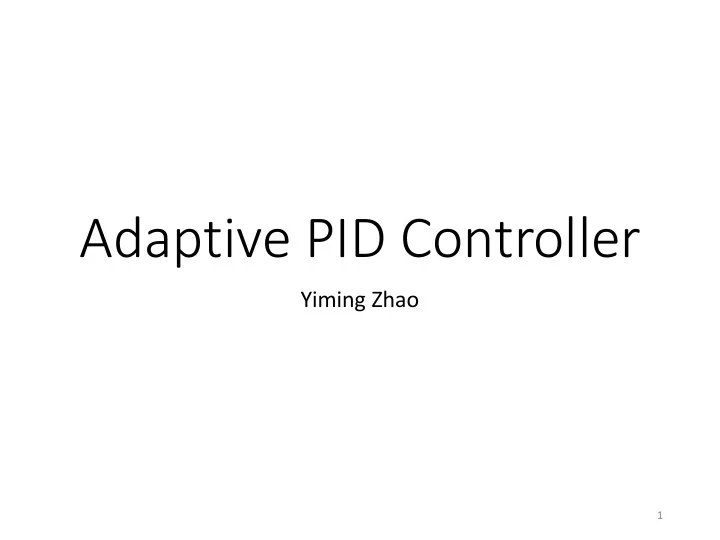

Adaptive PID Controller Yiming Zhao 1
Contents • Control system • PID controller • Adaptive PID 2
Control System • Open-loop system OUT IN PLANT 3
Control System • Closed-loop system/feedback control system input reference error output CONTROLLER PLANT - SENSOR 4
PID - Introduction • Proportional-integral-derivative https://en.wikipedia.org/wiki/PID_controller 5
PID – P,PI,PID 6
PID – Basic Tuning Four major characteristics of the closed loop step response Rise Time Overshoot Settling time Steady state oscillation error K p Decrease Increase NT Decrease increase Decrease Increase Increase Eliminate increase K I K D NT Decrease Decrease NT de/increase 7
PID – Basic Tuning Source: wikipedia https://en.wikipedia.org/wiki/PID_controller 8
PID - Tuning Methods • ZN (Ziegler Nicholes) reaction curve method • ZN step response method • ZN Frequency response method • ZN self-oscillation method • Matlab/simulink 9
PID – Ziegler Nicholes reaction curve method Controller Kp Ki Kd P T/L PI 0.9(T/L) 0.27 T/L^ 2 PID 1.2(T/L) 0.6T 0.6 T/L^ 2 Source: Verver Training Ltd, Three term controller tuning 10
PID – use case in real world • Drone wings with PID u y v e ref - PID DAC ACTUATOR Delay PLANT θ θ ADC Gyroscope 11
PID - Implementation Source: https://www.youtube.com/watch?v=7qw7vnTGNsA&list=PLl0qyij_5jgF_75V49owrHSDCCAvwAVhw&index=2 12
Adaptive PID – Movtivation • To fit into different circumstance • To make the automation working • Personal interest (IAS) 13
Adaptive PID – Self tuning • Gain-scheduling controller structure Scheduling Variable Gain scheduler reference - CONTROLLER PLANT SENSOR source: P.A. Tapp A, A Comparion of three self-tuning control algorithms 14
Adaptive PID – Self tuning • Self-tuning controller structure PLANT ID & Parameter Parameter Adjustment d Estimation reference CONTROLLER + PLANT - SENSOR source: P.A. Tapp A, A Comparion of three self-tuning control algorithms 15
Adaptive PID – Self tuning • Model-reference adaptive controller structure Desired Value Model Parameter Adjustment reference CONTROLLER PLANT - SENSOR source: P.A. Tapp A, A Comparion of three self-tuning control algorithms 16
Adaptive PID – auto tuning • PID auto-tuning scheme using neural networks Parameter converter reference e(t) y(t) CONTROLLER PLANT - SENSOR source: Frankcklin Rivas-echeverria. Nerual Network-based Auto-Tuning for PID Controllers 17
Adaptive PID – PIDNN • Suitable for non-linear system • Computation critical reference PLANT SENSOR source: F. Shahraki, M.a. Fanaei. Adaptive System Control with PID Neural networks 18
Conclusion Conventional PID Control Adaptive PID Control Analytical approach Learning based approach Good for linear systems Suitable for non-linear systems Sensitve to the change of plant system Doesn‘t need to know the detail of the plant system Fast calculation just in time Slow in learning phase 19
References • [1]F. Shahraki, M.A. Fanaer Neural Network-based Auto-Tuning for PID Controllers • [2] F. Shahraki, M.A. Adaptive System Control with PID Neural Networks • [3] Astrom, K. J. and Haggland, T. 1988, Automatic Tunning of PID Controlles • [4] Karl Johan Åström (2002) Control System Design (Chapter 6) • [5] H.L. Shu, Y. Pi (2005), Decoupled Temperature Control System Based on PID Neural Network 20
Recommend
More recommend